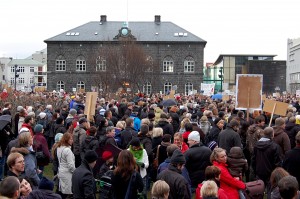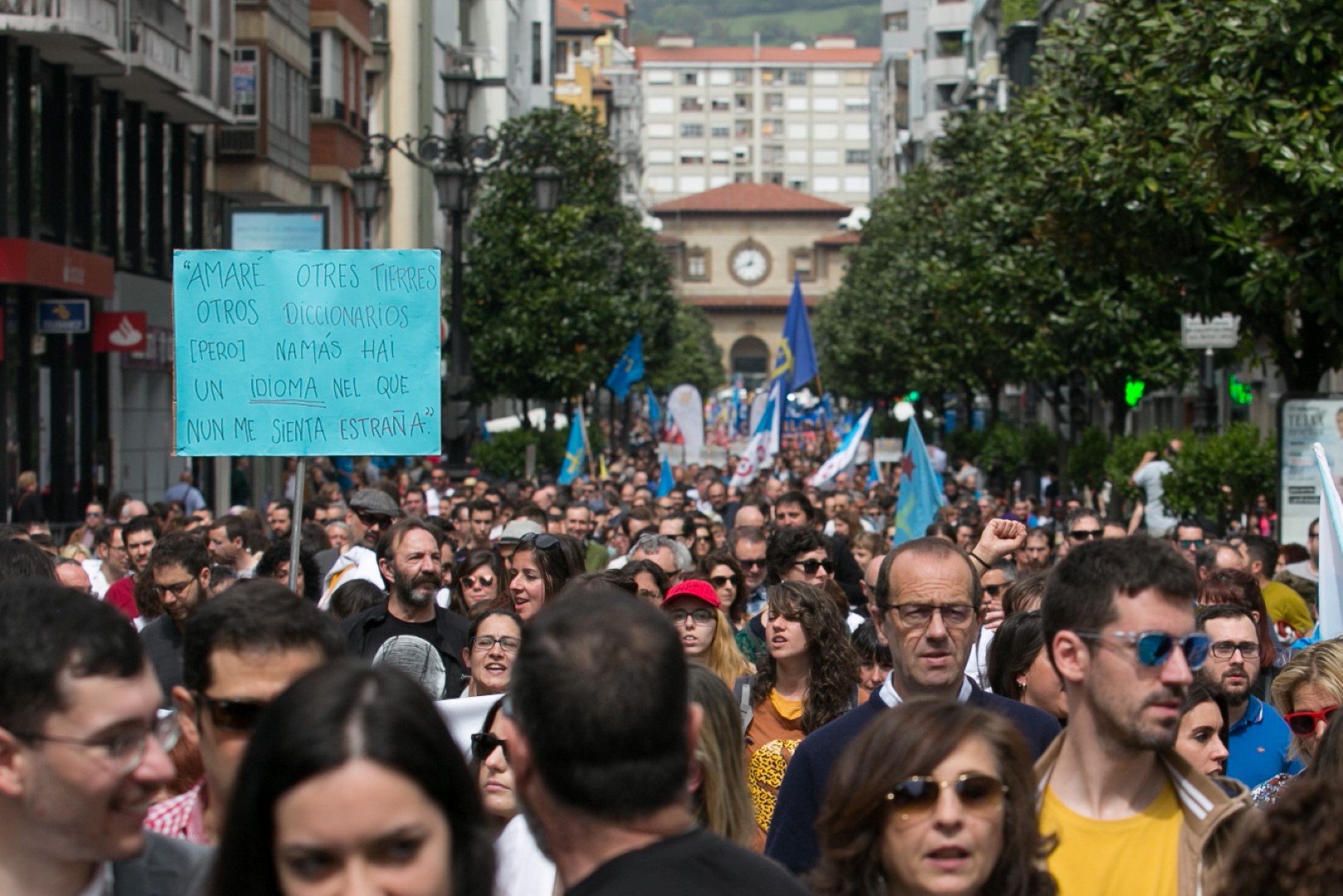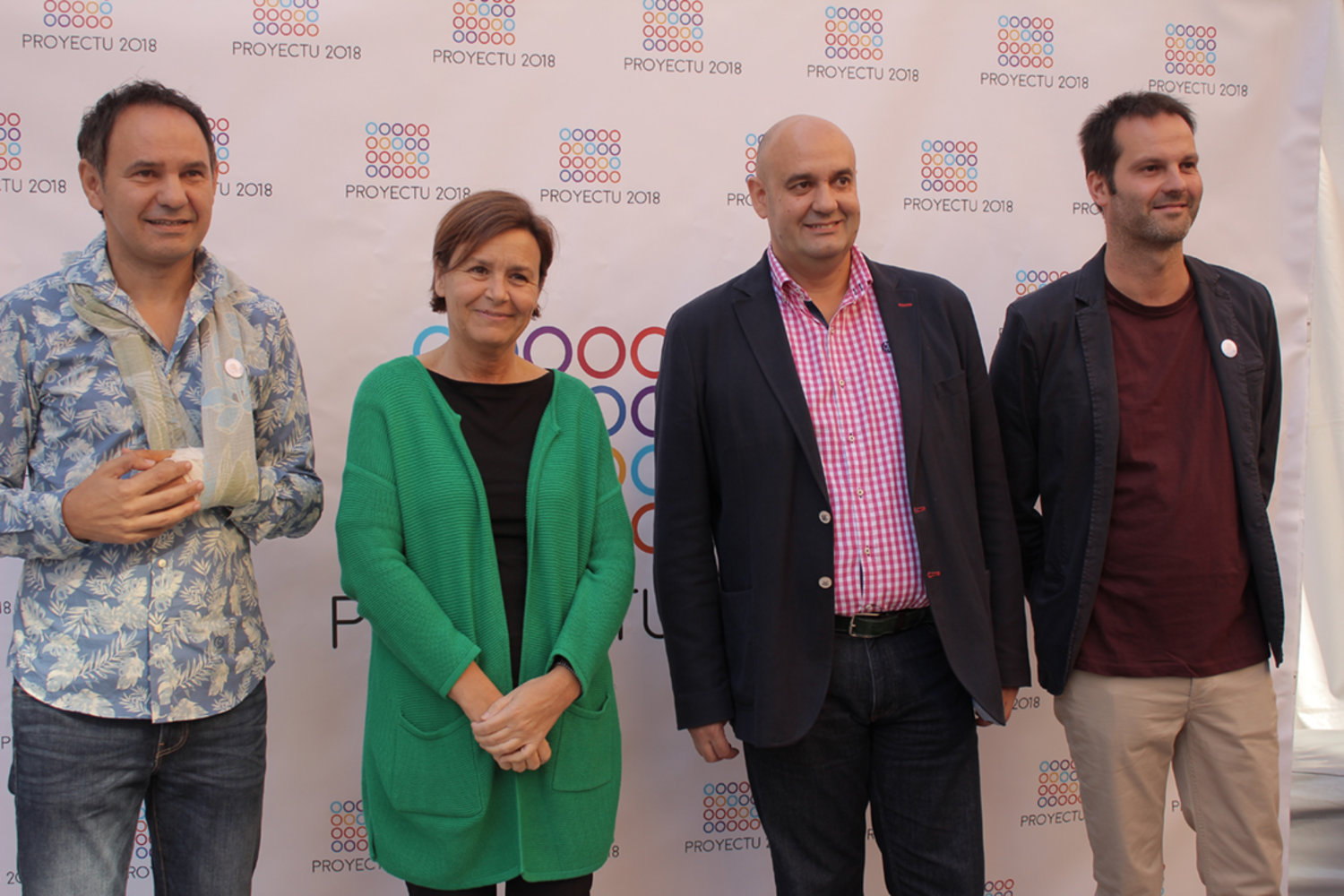N´asturianu
The bitter sweet rebellion of Iceland
Gudmundur Andri Skulason / Iceland Association of Debtors. Gunnar Sigurdsson / Open Civic Forum.
No one would have believed how fast things can turn during an economic turbulence, nor would anyone have believed how defenceless and bewildered  leaders of one country can prove to be when faced with difficult decisions.
leaders of one country can prove to be when faced with difficult decisions.
In early 2008, storm clouds were piling up around the banking system worldwide. Economists, bankers and politicians were fully aware of the fact that things were about to change and that one possible outcome of that change could be a reconstruct system and thus, other people and groups in command.
Some individuals outside the “power circle” also realised that the system they for so many years had believed in, wasn’t sustainable.
Debt controlled banking system had come to an end. Bank-controlled politicians had become vulnerable and people’s unconditional faith in the market was diminishing.
The collapse
The once admired Icelandic banking sector had grown tremendously since the privatisation of its two major banks, Landsbanki and Kaupthing, in the year 2002. It’s aggregate size had outgrown the countries GDP by a factor of 10 and the wizards managing those remarkable banks were awarded and prized for their incalculable contribution to the Icelandic wealth. We, as a nation, had struck gold and finally we could take our hands out of the fish guts and spread our wealth by acquiring established companies throughout Europe.
We had yet again become the Vikings of the world. The only difference was that now we were admired for our intellect instead of being feared for our assaults and battery in the past. Our bankers were superior and our stubborn mentality combined with natural wonders of efficient decision-making and determination, would able us to buy our way to credit and admiration.
– Or, would it?
In October 2008, the Icelandic banking system collapsed like a house of cards. Subsequently the people realized that somebody had been pulling their leg. Just a few days before the complete meltdown of the banks, their executives argued that their financial status was sound. The Prime Minister stated on live television that the situation was under control and that people had no reason to panic. Hours later he was speaking to the nation, begging God to bless Iceland. Within a week the three largest banks were bankrupt. The krona tumbled and its value was reduced by more than 50% over night. Currency indexed mortgages tripled and inflation indexed mortgages soared due to wave of inflation caused by the complete devaluation of the krona.
The public was astounded. – What had happened? – How could this happen? – Why did this happen?
The government was at standstill. Government officials were running back and forth, but nothing happened. No imminent solution was in sight and the people lost their hope.
The rebellion
The aftermath of the downfall is a case study of why the result of our rebellion and actions is stagnation.
When people realized that the government wasn’t capable of taking on it’s responsibility by putting into action necessary measures, groups started to form and an organized rebellion came into being. Weekly protests were arranged outside the parliament, civic forum meetings took place and the public started to ask questions. When the authorities couldn’t answer, anger took control. Overwhelmed with disbelief and distrust, people gathered in their thousands in front of the parliament, banging their pots and pans, along with anything else they could find to make noise. Within few days the government gave up. A successful rebellion took place and an election was called, half way into then current government’s term.
In their mind people had won. Hope started to flourish, grassroots movements started to take action, demands were carried out and finally the system took the cotton out of its ears and listened. – Or so the public thought.
Promises were being made, solutions plotted and measures taken to implement the demands of the people.
The opposition parties promised the abolishment of inflation indexed mortgages, to cut ties with the International Monetary Fund, and last but not least, to protect homes from creditors by building a “Wall of Shields” around peoples homes.
A Scandinavian welfare society was promised. People should be the starting point of all measures taken and the banks ought to stand over.
Once again we had struck gold. The financials tremors around the world were to be the starting point of a new form of society in Iceland. A sustainable and just society was to be born and built from the ruins created by the downfall. – Or so the public thought!
Things were about to change. Because of general anger, hopelessness and disbelief in current system the right-wing government, lead by the Independent party had been taken down. They were replaced by a government led by the Social democrats, co riders of the Independent party in previous government, and the Left green party, formerly known as the Communist party of Iceland. For the first time in the history of the Icelandic democracy there was a clean left wing government in power. The rebellion had been a success and the people got everything they asked for.
-Or did they?
The stagnation
Today, more than two years after the present government came to power, no promise given ahead of last elections has been fulfilled. In fact, the so called «left-wing» government is still bailing out failed banks with taxpayer money, the inflation has trapped house owners in over-mortgaged properties and every measure taken by the government has been in favour of the old financial system. The once hated IMF was now controlling the radically left winged financial minister. The state treasury deficit is growing, state debts are becoming uncontrollable and the government seems to be doing everything in it’s power to maintain the old, already collapsed, bank-driven hierarchy, according to IMF wishes.
Countless things have been done in an attempt to investigate what went wrong. A special parliamentary investigation commission wrote an investigative report in excess of three thousand pages, which contains details about potential wrongdoings within the administration. It also points out possible criminal acts by both public officials and high-level executives within the financial sector.
This ambitious work is now collecting dust under a cabinet chair and no administrative changes have been implemented as a result of this report.
A special prosecutor was assigned for the purpose of investigating potential financial wrongdoing. Three years after the total meltdown of the Icelandic banking system, two cases have been brought to court, four persons indicted and one convicted in district court.
The former Prime Minister, Geir H. Haarde, has, as the only member of the former government, been indicted by the Parliamentary High Court for his inaction in connection with or in the wake of the collapse of the Icelandic banks. Present Prime Minister, Johanna Sigurdardottir, was just as inactive as the Secretary of State for Social Security in previous government.
The writing of a new constitution was crowd-sourced and has now been handed over to the parliament for formal handling. Nothing has on the other hand been done to ensure that present government officials do follow the actual and current constitution.
In fact, hardly anything has changed. Regardless of the effort of thousands of people, regardless of peoples hopes raised by ambitious promises from desperate politicians, regardless of the apparent need for structural change in both the political and financial system.
Why is that?
We may never give up
In our humble opinion it is because of our own inability to organize our selves and our inability to work together as a team of people with the sole purpose of building and populating a just and sustainable society. It’s because we look at politics as a game of sports and we cheer our political favorites like a team of footballers, regardless of how well they are playing. The same people who banged their pots and shouted their heads blue in the purpose of removing an unfit government, are now perfectly happy since “their team” is now winning the game, even though “their team” is just as unfit and useless as the other team.
The few people standing up, risk being condemned if they criticise the wrong people or the wrong political party. And since most people are the wrong people in someones eyes, everyone is being condemned. We are therefore building a society saturated with hate and revenge. We are unvillingly fighting our selves and therefore making sure that the old bank-driven system will prevail. Just as it always has.
But. We may never give up. We have to believe in our rights and we have to believe that the society exist for the purpose of people, not the other way around. We must reform our approach and we must organize. People from all over the world have showed that change is imminent. Current holders of power are loosing their grip and we, the people must stay focused and united so that imminent changes will fall in our favour. We have a vision, and we have to stick to our vision.
PUBLISHED IN ATLANTICA XXII, Nº 15








You must be logged in to post a comment Login